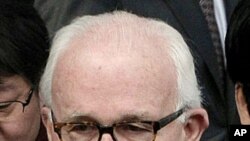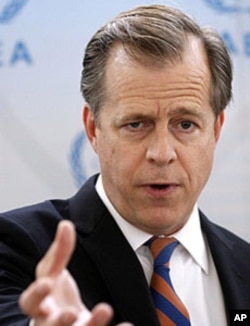The United States says it will hold another round of “exploratory” talks with North Korea next week in Geneva on Pyongyang’s readiness to fulfill nuclear disarmament commitments. The State Department also has confirmed that its special envoy for North Korea, Stephen Bosworth, is stepping down.
Officials say the announcement of new talks with Pyongyang and the pending departure of special envoy Bosworth is coincidental, and reflects no change in U.S. policy toward North Korea and its nuclear program.
Bosworth is a retired senior diplomat who took the North Korea post on a part-time basis in 2009. He will be leaving shortly to return full-time to his job as dean of the prestigious Fletcher School of Law and Diplomacy at Tufts University near Boston.
His successor will be veteran diplomat Glynn Davies, a State Department East Asia specialist who has until now been U.S. ambassador to the International Atomic Energy Agency.
At a news briefing Wednesday, State Department Deputy Spokesman Mark Toner confirmed the change and the U.S.-North Korean meetings next Monday and Tuesday in Geneva. He said Bosworth will head an interagency U.S. team to the meetings and will introduce Davies to his counterpart, North Korean Vice Foreign Minister and nuclear envoy Kim Kye Guan.
The Geneva meeting is part of a warming trend in contacts between North Korea and the United States and South Korea in recent months that has given rise to hopes for a resumption of stalled six-party talks on North Korea’s nuclear program.
Spokesman Toner called the Geneva round a continuation of exploratory contacts aimed at determining if Pyongyang is ready to take “concrete” steps to fulfill previous nuclear commitments.
“We want to see it take steps toward de-nuclearization. I’m not going to give specifics on what those steps are. But what we want to see is a seriousness of purpose. We’re not going to, as we’ve said many times, reward North Korea just for returning to the table, nor give them anything new for actions they’ve [already] agreed to take,” he said.
North Korea agreed in principle at the six-party talks in 2005 to scrap its nuclear program, including a presumed small stockpile of weapons, in return for economic and diplomatic incentives from other participants.
But Pyongyang pulled out of the Chinese-hosted talks in 2009 after being censured for a long-range missile test. Its relations with Seoul were in crisis last year after the sinking of a South Korean navy ship and the shelling of a South Korean island near the North Korean border.
North Korea expert Bruce Klingner, senior research fellow for Northeast Asia at Washington’s Heritage Foundation, says he sees no softening of the U.S. and South Korean approach to Pyongyang, despite the recent political outreach.
“What we may have is a greater willingness to have meetings, perhaps even a series of bilateral meetings," said Klingner. "But the emphasis by officials has been that if North Korea isn’t willing to fulfill some preconditions, or actually make some positive movement, then the meetings won’t be very successful.”
Klingner says the United States and Seoul want to see further progress in intra-Korean relations, a freeze on North Korean nuclear activity, including a halt to a uranium enrichment effort disclosed last year, the return of IAEA inspectors to North Korea’s Yongbyon nuclear complex, and a long-range missile test moratorium.
He says the increased diplomatic activity likely forced the U.S. move to a full-time North Korea envoy, and that South Korea may have quietly resented the fact that the outgoing envoy Bosworth was dividing his time between his diplomatic and academic roles.
The State Department also confirmed Wednesday that diplomat Clifford Hart is replacing Sung Kim as U.S. envoy to the six-party talks. Kim, a Korean-American, was confirmed by the Senate last week as the new U.S. ambassador to South Korea.





